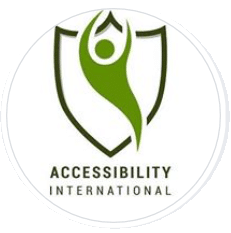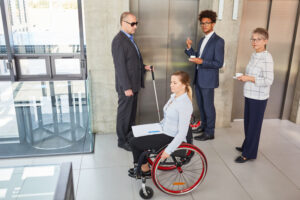Third quarter accessibility lawsuits have been on the rise, despite the dramatic drop earlier this summer. At first glance, the Q2 decrease in digital accessibility lawsuits looked like a good indication that the transition from in-person to online was going well. Unfortunately, the decrease happened in April and May, when COVID closed many physical businesses- including courts and lawyers’ offices.
In their haste to switch to a digital platform, many companies forgot to consider accessibility. Switching to an online format has enabled many people to have increased access to products and services. More restaurants are offering delivery, students are learning in virtual classrooms, and brick-and-mortar stores have increased their eCommerce offerings. While having more options that don’t require them to leave their homes has made life easier for many people with disabilities, it didn’t work for everyone.
Third quarter accessibility lawsuits quickly returned to pre-shutdown levels. Here is a look at a few of them.
In June of 2020, a California Circuit Court of appeals ruled that San Diego County Credit Union’s website should be considered a service offered by a place of public accommodation, and must be accessible according to the ADA. This conforms to the precedence set by another California Appellate court in Thurston v Midvale, that a website should be considered a place of public accommodation if it has a nexus to a physical, “brick-and-mortar” place of public accommodation.
Abelardo Martinez is blind and was unable to access information on the San Diego County Credit Union’s website because it was not compatible with his assistive technology. Empty and missing links, unlabeled form fields, and a lack of alternative (alt) text for images all made the website inaccessible.
Originally, lower courts dismissed the case, stating that the website did not connect directly to the products and services offered at their physical banking locations. The website features a physical location locator and information about the credit union’s products and services. All of those features connect the website to its physical locations. Martinez appealed the case. California state court appellate decision found that lower courts had erred and should be covered by the ADA. This is also in line with the federal U.S. Court of Appeals for the Ninth Circuit.
A California woman, who is blind, threatened as many as 15 bicycle shops in California with accessibility lawsuits. She alleges their websites are not accessible to her assistive technology. These bike shops aren’t related, but most had hired the same hosting service, SmartEtailing, to build their websites.
SmartEtailing prides itself on accessibility, building sites to comply with WCAG 2.1, and ranking highly with Google’s Lighthouse audit tool. They’ve contacted their clients who have received these letters, but they have also made it clear that SmartEtailing is not responsible for accessibility issues. SmartEtailing told its clients in an email that “While SmartEtailing hosts your website, your business is ultimately responsible for the content published on your website and any alleged ADA compliance issues.”
Accessibility Requires Maintenance
There is a lesson to be learned from these potential accessibility lawsuits. Even websites built to be accessible and hosted on an accessible platform will need to be monitored for continued accessibility. Websites are often fluid, changing frequently when content is updated, moved, or replaced. If those changes aren’t made to be accessible, the whole website will be considered inaccessible. Maintain compliance by checking for accessibility regularly, particularly after updates.
Kahlimah Jones, a New York woman who is deaf, filed a class-action lawsuit against podcast streaming service Gimlet in July 2020. Jones alleges that Gimlet did not provide an accessible format for all listeners, thereby discriminating against her and other people who are deaf and hard of hearing. Many other podcast services offer closed captioning and/or transcriptions of the recordings so that individuals who are deaf or hard of hearing can enjoy the program as well. Gimlet did not offer those services.
Jones v Gimlet is the first ADA lawsuit against a podcast company, but the same problems apply. There are no hard, fast rules regarding how or if the ADA should apply to online-only products and services. The case has not yet gone to trial, but the outcome may have lasting effects on the podcast industry.
MaryAnn Murad of Michigan, who is blind, applied for a virtual customer service (VCS) position with Amazon. However, Murad’s assistive technology could not use the software Amazon requires customer service representatives to use for the job. Amazon didn’t offer her the job because she couldn’t use the software. Murad and the National Federation of the Blind (NFB) filed a lawsuit against Amazon.
Amazon worked with the NFB and Murad to come to a resolution. It created a proprietary, accessible software so VCS employees who use assistive technology can work remotely. Amazon and the NFB settled in July 2020. It allowed Murad and others to begin working remotely at a time when it is especially undesirable to work in a crowded office environment.
Lucius v General Wireless Operations, Inc. (RadioShack)
Windy Lucius is a woman who is blind and uses a screen reader to access the internet. She attempted to look up a RadioShack store location and identify which items were available there using the store’s website. She was unable to do so because the website was incompatible with her assistive technology. On September 21st, 2020, Lucius filed an ADA accessibility lawsuit against RadioShack, alleging that they had discriminated against her. Inaccessible labels and unlabeled buttons prevented her from accessing information on the website. The website had a nexus to the physical location because it would provide her with the location of the store and tell her whether the product she wanted was available to purchase there. Courts have held in the past that websites with a nexus to a physical location fall under ADA accessibility requirements.
Accessibility Lawsuits in Q4
While digital accessibility cases slowed for a few months during court closures, 3rd quarter accessibility lawsuits surged over the summer. As schools, stores, and offices reopen physically and virtually, more accessibility challenges will result in an increase in lawsuits moving into the fall and winter.
The Department of Justice has still declined to give further direction to companies regarding what constitutes compliance with the ADA and whether or not it applies to websites, but the recent Domino’s case suggests it should be applied to websites. WCAG 2.1 is an internationally recognized industry standard which many courts use to determine accessibility. Until the DoJ officially sets digital accessibility standards, the spike in 3rd quarter accessibility lawsuits will likely continue.
Don’t become another digital accessibility lawsuit statistic! Let Equidox help make your digital documents accessible to everyone.




